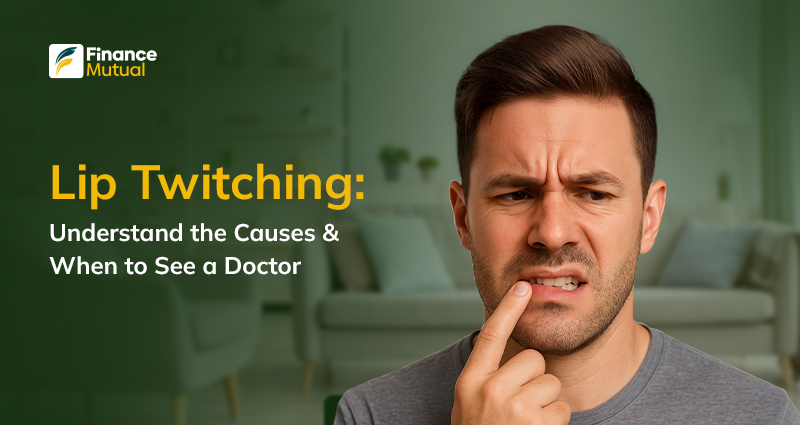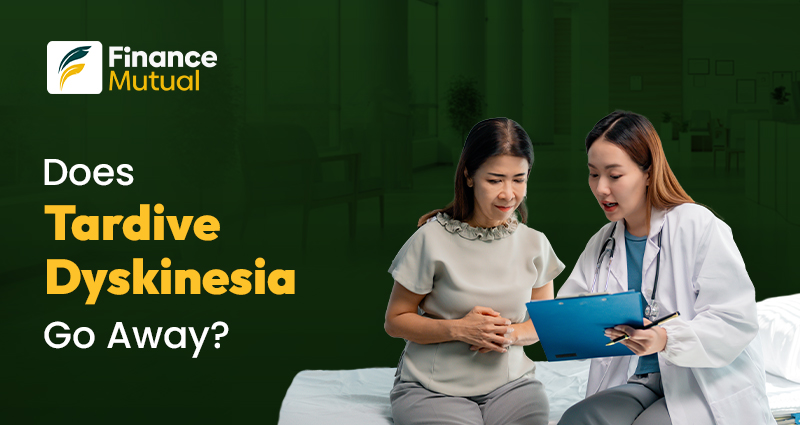
Lip twitching may seem small but it could mean something about your health. It can happen when you drink too much caffeine or don’t sleep well. And it can happen if your body lacks key vitamins or minerals.
You should also know your nerves can play a role, too. When they are not working properly, your lips may start to twitch. Even stress or dehydration can trigger this problem. And that's why you should not ignore these signs from your body. This blog explains why lip twitching happens and what you can do about it. You’ll know simple reasons and helpful tips to improve your condition that are easy to follow.
Lip Twitching Causes: The Common Ones
1. Too Much Caffeine and Lip Twitching
Caffeine is a stimulant that you get from coffee, tea, sodas, and energy drinks. It is also in chocolate and some medicines. So, you might have more than you realize. When you drink too much, your body starts showing signs you should not ignore.
A common sign is muscle twitching. And this can include lip twitching, too. But that’s not all caffeine can cause.
- It can make you feel anxious or restless.
- You might have trouble sleeping or feel your heart beating faster than usual.
- Too much caffeine can also dehydrate you. And dehydration can cause twitching.
So, if you drink a lot of coffee or similar drinks daily, pay attention to these signs.
What You Need to Do
Cutting back on caffeine can help. Start by drinking less coffee, tea, and soda. Also, check if your chocolate or medicines are adding to your caffeine intake. Drinking more water is important. It keeps you hydrated throughout the day.
Most people feel better when they reduce caffeine and drink enough water. But if your twitching does not stop, it may not just be about caffeine. In that case, you should talk to a doctor and find out what’s going on.
Managing your caffeine intake is simple. You don’t have to quit completely, but it helps to keep it under control.

2. Medications and Muscle Twitching
Some medications can cause muscle twitching in your body. This twitching is called fasciculation. And it happens when small muscle fibers move on their own. It can affect different parts of your body, including your face and lips.
You should know that certain drugs are more likely to cause this problem.
- Medicines like corticosteroids, lithium, and some antidepressants can lead to twitching.
- Even drugs for nausea, like metoclopramide and prochlorperazine, can trigger it.
- Some medicines for muscle conditions, like neostigmine, can also cause this issue.
- There are others too, like succinylcholine, flunarizine, and antibiotics like isoniazid. Mental health drugs like nortriptyline can also play a role.
It matters because twitching can be distracting during your day. In some cases, certain medicines may cause permanent twitching. That’s why it’s important to pay attention if you start noticing this side effect.
What You Need to Do
You can talk to your doctor if twitching becomes a problem for you. They can help you switch to another medicine. But don’t stop any medicine on your own. It can be risky.
You can also keep track of when the twitching happens. This helps your doctor understand what’s going on. And find the right solution for you.
3. Low Potassium and Lip Spasms
Potassium is a mineral that your body needs. It helps your brain send signals so your muscles and nerves work properly.
If your potassium levels drop, this system won’t work the right way. You might feel muscle cramps or twitching in your lips. This happens because potassium keeps your muscles moving the way they should.
You should know that potassium deficiency can affect your health. But the good news is you can fix this with simple changes.
You can eat more potassium-rich foods to increase your daily intake.
- Bananas, avocados, and coconut water are all easy options to include.
- Cow’s milk, beans, potatoes, spinach, and acorn squash also give you potassium.
- Sometimes you may need potassium supplements. If food alone is not enough.
What You Need to Do
You should always check with a doctor before taking any supplements. Some medicines can lower potassium. So, you should also review what you take. If you keep your potassium levels right, you can avoid cramps and weakness. This helps your muscles, heart, and nerves stay healthy every day.
Upper & Bottom Lip Twitching: The Other Reasons
Alcoholic Neuropathy
Alcoholic neuropathy is nerve damage. Drinking too much for many years is a common reason for this damage. It happens because alcohol harms the protective layer that keeps your nerves healthy.
When this layer breaks down, you may feel twitching in your lips or eyelids. You may also feel burning, tingling, or pins-and-needles sensations in your hands or feet.
These feelings can slowly get worse over time. That’s why quitting alcohol is the best way to stop this.
If you cannot stop, your doctor can help or guide you to treatment. Healthy eating and vitamins may protect your nerves. But they cannot fully fix the damage. So you should act early. Waiting too long makes recovery harder.
Bell’s Palsy
Bell’s palsy makes the muscles on one side of your face weak or stiff. You may find it hard to move your mouth, nose, or eyelid. And sometimes your lip may twitch or one side of your face may droop.
Doctors don’t fully know why this happens.
But it’s linked to certain viruses that can become active again in your body. These include the virus that causes cold sores, chickenpox, and shingles. And sometimes Lyme disease can also lead to Bell’s palsy. Stress or poor sleep may trigger it, too.
There is no single cure. But treatment can help reduce swelling and support your recovery.
Doctors often give corticosteroids to reduce inflammation. And you may get antiviral medicine in some cases. Physical therapy can help keep your face muscles strong. If your eye won’t close fully, you need to protect it from dryness. So you can use eye drops and tape them shut while you sleep.
Most people get better in a few weeks. But sometimes full recovery can take longer.

Hemifacial Spasms
Hemifacial spasms happen when muscles on one side of your face twitch. You may see it near your mouth or eye. And it happens without control. It usually happens when something presses on your facial nerve. That nerve controls face movements like blinking, smiling, and closing your eyes.
A blood vessel often presses on the nerve. But sometimes a tumor can do this, too. Doctors use MRI or CT scans to check if your nerve is under pressure. These tests help doctors see the exact reason and plan your treatment properly.
Botox is a common way to stop the twitching, but it only works for a while. It relaxes the muscles and reduces spasms, but you need it every six months. If Botox does not help enough or symptoms get worse, surgery can be an option.
Doctors can do microvascular decompression. And this removes pressure from the nerve. This surgery gives long-term relief and can stop the twitching for many years.
Hemifacial spasms can feel stressful and affect your confidence. But you can manage it with treatment and proper care. So talk to your doctor and find out what works best for you.
Tourette Syndrome
Tourette syndrome is a condition where you make movements or sounds you can’t control. These are called tics. You may notice lip twitching, puckering, or sudden sounds. Tics are not dangerous. But they can feel uncomfortable or distracting sometimes.
Doctors don’t know the exact cause. They think it runs in families.
Things like smoking during pregnancy or childhood infections may also increase the risk. Tourette syndrome often starts when you are young. And it may improve as you grow up.
There’s no cure. But there are ways to manage it and reduce your tics.
Doctors may give medicines that block dopamine or help with stress and anxiety. Botox can help, too, if your tics cause facial movements like lip twitching. Therapy may help you manage stress so tics happen less often. You should talk to a doctor to learn what treatment works best for you.
How to Stop Lip Twitching
Lip twitching can happen for many reasons. Sometimes it’s because your body lacks potassium.
You can eat bananas, spinach, broccoli, or avocados to fix this. But in some cases, a condition like hemifacial spasm may cause twitching. Doctors may suggest Botox injections to stop this problem.
Caffeine can also trigger twitching for some people. And drinking more than three cups a day may make it worse. Try cutting back or quitting caffeine completely to feel better.
Alcohol may add to the problem, too, so limit or avoid drinking. You can also press your lips gently or use a warm cloth to relax them. But if twitching won’t stop or you feel unsure about the cause, see a doctor.
And remember, stress, poor sleep, or dehydration can trigger twitching, too. So, take care of yourself, rest enough, and drink water throughout the day.
When to See a Healthcare Provider for Face Twitching Near Mouth
Lip twitching on its own is usually not serious. It can happen if you feel stressed, tired, or drink too much caffeine. It can also happen if your body lacks enough potassium.
You can try eating better and cutting back on caffeine and alcohol. But if these changes don’t help, you should talk to a healthcare provider. You should also talk if you have other symptoms along with lip twitching.
If twitching keeps coming back, it means something might need attention. It matters because it can cause stress or affect your daily life. A provider can help you check for nerve or muscle issues if needed. That’s why getting care early can help you stay well and avoid problems.
Pay for Your Treatment with FinanceMutual™
At first, lip twitching might feel like nothing. But there might be hidden health risks behind it. And you have to seek the right treatment for these issues. Most of these treatments will cost you a lot. Your insurance might cover some of the cost of it, but out-of-pocket expenses are inevitable.
That’s why you should seek healthcare providers who provide flexible payment plans using FinanceMutualTM. It can help you pay for your treatment without the burden of hefty upfront costs.
But not all healthcare providers offer payment flexibility. You can inquire about possible payment options during consultations.
The End Note
You should always pay attention when your body shows signs like lip twitching. Sometimes, simple lifestyle changes can help you feel better quickly. But in other cases, medical care may be the right step for you. That’s why it matters to act early before small problems get bigger.
You may worry about the cost of care when you visit a doctor. FinanceMutual™ can help you manage this by offering flexible payment options. This way, you don’t have to delay care due to financial reasons. It’s always better to prioritize your well-being and get support when you need it.

FAQs
1. Could Dehydration Explain Why Is My Lip Twitching After Exercise?
You may be dehydrated after exercise, causing lip twitching and muscle imbalance. Drink more water and replenish electrolytes to reduce twitching and feel better quickly.
2. Why Is My Nose Twitching When I Feel Anxious or Stressed?
Anxiety triggers nerve overactivity, so your nose twitching is a stress response. Try relaxation exercises and deep breathing to calm your nerves and stop twitching.
3. Why Is My Upper Lip Twitching More Often After Drinking Several Cups of Coffee?
Excess caffeine stimulates your nerves, leading to frequent upper lip twitching. Reduce caffeine gradually and stay hydrated to calm your muscles and nerves.
4. Why Is My Bottom Lip Twitching After Starting a New Antidepressant?
Some antidepressants can cause muscle twitching as a side effect. Consult your doctor before adjusting medication so they can recommend safer alternatives.
5. Why Does My Lip Twitch When I Don’t Get Enough Potassium?
Low potassium affects nerve signals, making your lips twitch unexpectedly sometimes. Eat potassium-rich foods like bananas and spinach to restore healthy nerve function.
6. Why Does My Lip Keep Twitching Despite Reducing My Caffeine Intake?
Other causes, like stress, fatigue, or nerve issues, could make twitching persist. Monitor your symptoms and see a doctor if twitching doesn’t improve after changes.
7. What Are the Face Twitching Near Mouth Causes Related to Nerve Issues?
Face twitching can happen if nerves are compressed or inflamed in certain conditions. Seek medical advice to check for facial nerve compression or Bell’s palsy symptoms.
8. Could Frequent Twitching Suggest a Risk of Lip Twitching Stroke Symptoms?
Lip twitching alone is rarely a stroke sign unless other symptoms also appear. Watch for drooping face or speech problems and call emergency help immediately if present.
9. Why Do I Notice Lower Lip Twitching After Heavy Alcohol Use?
Excess alcohol can damage nerves over time, leading to lower lip twitching. Cut back on alcohol and seek help if you struggle to reduce consumption.
10. Is Vitamin Deficiency Linked to a Sudden Lip Quiver?
Yes, lacking vitamins like B12 may cause your lips to quiver suddenly. Eat a balanced diet or ask your doctor about supplements if needed.
11. Does the Lip Twitching Meaning Change If It Happens Only on One Side?
One-sided twitching could suggest nerve compression or Bell’s palsy, needing attention. Visit a doctor if it persists or is accompanied by facial weakness or drooping.
12. Could Top Lip Twitching Be an Early Sign of Bell’s Palsy?
Yes, Bell’s palsy can cause sudden top lip twitching and facial muscle weakness. Seek treatment early to improve recovery and protect your eye on the affected side.
13. How to Stop Bottom Lip Twitching Caused by Stress or Fatigue?
Rest, hydrate well, and practice relaxation techniques to ease bottom lip twitching. Reduce daily stress and improve your sleep routine to calm your nerves naturally.




